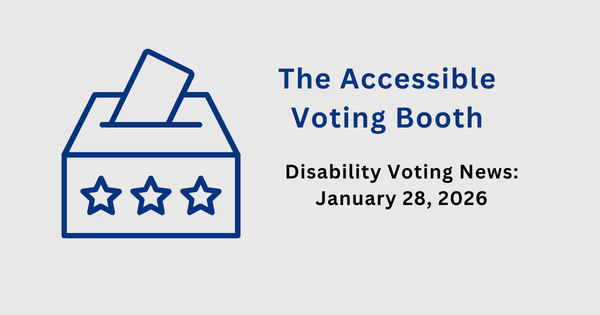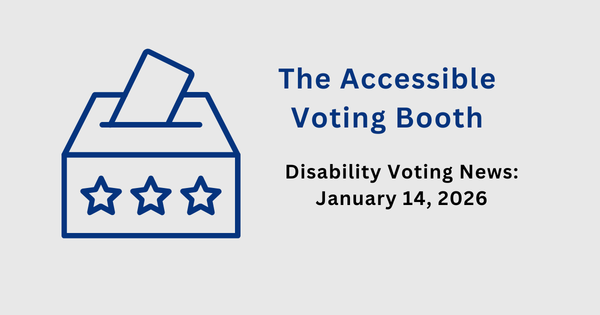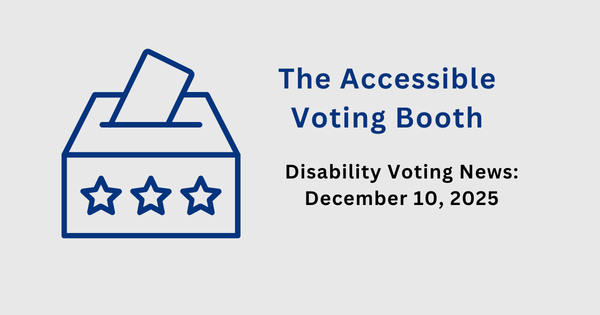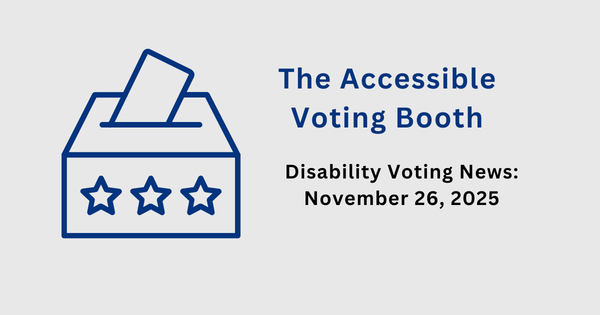Disability Voting News: June 18, 2025
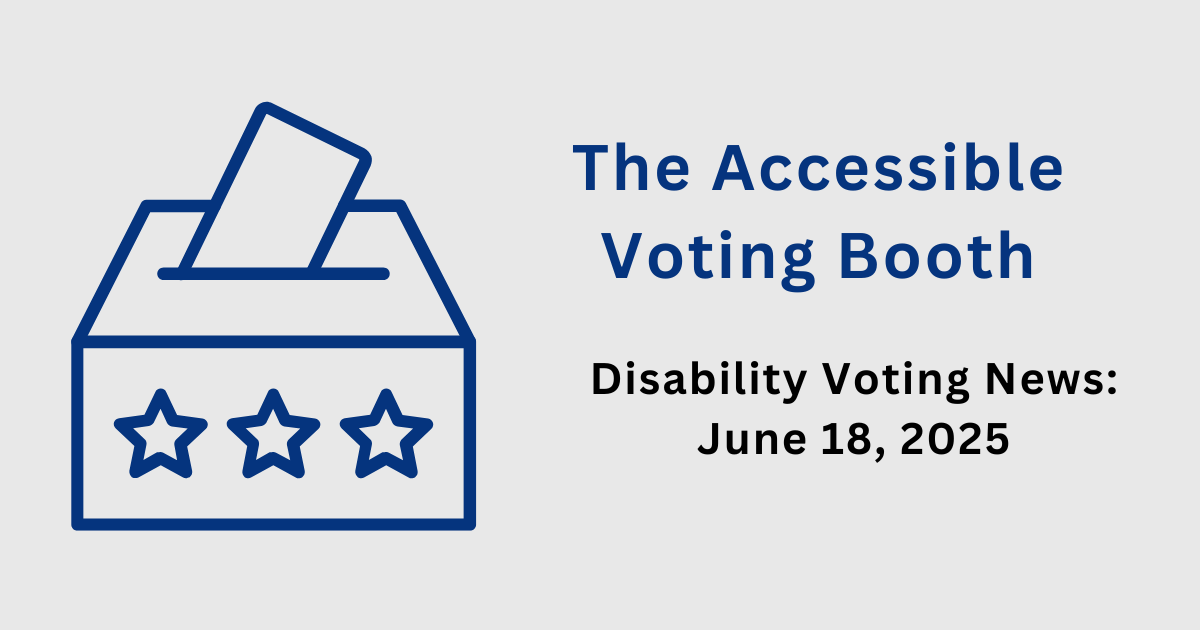
Welcome to this week’s edition of The Accessible Voting Booth. We’re going to discuss some concerning legislation in New Hampshire, how Kenya is taking steps to make voting more accessible, and New Jersey’s consideration of a state voting rights act.
New Hampshire disability rights advocates sound alarm over bills tightening voting requirements. (via New Hampshire Bulletin).
Disability rights advocates are concerned about two bills in New Hampshire that would impact access to voting. The New Hampshire Bulletin provided some coverage of disabled voters’ concerns. Let’s dive into the legislation:
SB 287 would require every applicant for a mail ballot to provide verification before they are issued a ballot: a voter can submit a copy of photo ID, present ID in person to their local clerk, or include a notarized signature. Currently, voters applying for a mail ballot must only provide their name and address on the application.
Disability rights advocates in New Hampshire are rightfully concerned because this requirement will make it harder for people with disabilities, especially those who are homebound, to be able to vote. They point out that many people are unable to go into their city or town hall to request an absentee ballot. In New Hampshire, you have to have a specific qualifying reason to vote by absentee ballot such as having a disability or illness that prevents you from voting in person. It’s reasonable to assume that if someone has a disability or illness that prevents them from voting in person, they will probably have a hard time going in person to the clerk’s office to present ID.
They also raised concerns about access to technology to print copies of their documents or have access to a notary to affirm their signature. Representative Ross Berry, the Republican who introduced SB 287, countered this by saying that New Hampshire offers digital notarization options. However, voters with disabilities may not be aware of these options, and we can’t yet know whether state or local election offices will make an effort to inform them of these options. These may also present barriers, as notaries usually charge a fee for notarizing documents.
HB 613 is another concerning piece of legislation in New Hampshire that would impact access to voting. In 2024, New Hampshire passed legislation requiring the use of accessible voting machines in local elections, as the Help America Vote Act only requires accessible voting equipment in elections with federal candidates on the ballot. HB 613 would create an exemption wherein jurisdictions could post a notice on their website informing voters that there will not be accessible voting equipment in a local election unless a voter informs the clerk in writing at least two months before Election Day that they need to use accessible voting equipment.
This is a ridiculous exemption that would put the burden on disabled voters to ensure that polling places are accessible, as they would have to not only be aware that they need to request accessible voting equipment before a local election, but they would have to inform the local clerk in writing at least two months before that election that they need accessible voting equipment. Every polling place should have accessible election equipment for every election. Disabled voters shouldn’t have to go out of their way to inform clerks that they need voting to be accessible to them. James Ziegra, senior staff attorney at Disability Rights Center of New Hampshire calls HB 613 unconstitutional and says “it gives an out to towns that don’t want to provide disabled residents the means to vote accessibly.”
As clerks would post these notices on their websites, I have to ask: are those local election websites even accessible to voters with disabilities so that they can read the notice and access the information they need to contact their clerks? We know that most state voter registration websites are not fully accessible. I don’t know of any studies on the accessibility of local election websites, but local governments generally have fewer resources and likely have less knowledge about website accessibility. The voters who are most in need of accessible voting equipment, including voters who are blind or have low vision and voters with mobility disabilities that impact their ability to read and mark a ballot by hand, are more likely to encounter web accessibility barriers and challenges with using assistive technology to navigate inaccessible websites. This means that voters who need to use assistive technology at the polls may not even be able to receive notice that they will be denied access, as the notice itself may be on an inaccessible website.
Disabled voters deserve equal access in all elections, from Presidential elections down to local races. Jurisdictions should not be extended the ability to “opt out” of providing full access to voters with disabilities, and disabled voters should not be shouldered with the burden of informing election officials about their access needs prior to every local election.
Kenyan government to roll out secret ballot voting system for visually impaired voters. (via Nairobi Wire).
Last week, Kenya’s Government Spokesman Isaac Mwaura announced that Kenya will be rolling out a “special secret ballot mechanism” designed to enable voters with vision disabilities to vote privately and independently. Currently, Kenyan voters who are blind or have low vision must do so by having officials from the Independent Electoral and Boundaries Commission (IEBC) mark their ballot. Kenyan officials hope that the secret ballot mechanism will enhance confidence and trust in voting by ensuring that these voters can cast a ballot privately, independently, and without interference.
While there are no details yet on what this secret ballot system will look like, this is encouraging news, and it comes in the wake of the enactment of the Persons with Disabilities Act 2025, which creates a comprehensive legal framework for enforcing the rights of people with disabilities. The legislation broadly addresses improving disability rights in Kenya in alignment with Kenya’s Constitution and the UN Convention on the Rights of Persons with Disabilities. It puts in place a quota to ensure that at least 5% of employment positions in national and county governments are filled by people with disabilities, recognizes the right to barrier-free and disability-friendly environments, addresses discrimination, and promotes disability mainstreaming in government agencies and learning institutions.
New Jersey considers state-level voting rights act legislation (via Voting Rights Lab).
Last week, I shared the news of Colorado’s enactment of a state-level Voting Rights Act, making it the 9th state to enact state voting rights legislation. Colorado is not the only state to consider this kind of legislation: New Jersey legislators are currently considering A 4083, the “John R. Lewis Voter Empowerment Act of New Jersey,” which was introduced during the 2024 legislative session and has been carried over to 2025. This legislation was referred to the Assembly Appropriations Committee on June 12, so it still has a long way to go to be considered and passed, but it has a lot of great provisions that would protect voting rights and marginalized voters.
The legislation includes prohibitions on policies that would negatively impact voters of protected classes and gives members of protected classes standing to sue for enforcement of the act’s provisions. It requires voting materials in languages other than English for jurisdictions that have populations that speak languages other than English. The legislation would also require covered entities to seek pre-clearance for election-related practices. These covered entities include jurisdictions that have been subject to court orders related to civil rights violations in the past 25 years, as well as jurisdictions that fit other criteria such as having certain poverty or voter participation rates.
The Voting Rights Lab has a great writeup of the important provisions of this bill, so I encourage you all to head over and read that for the full picture. Let’s hope New Jersey can be the next state to implement a voting rights act!
Thank you for reading this week’s edition of The Accessible Voting Booth! As always, if you’d like to support the newsletter and my work, here’s how:
- Subscribe to the Accessible Voting Booth newsletter.
- Share this newsletter with your network to spread the word about disability voting rights.
- Leave me a tip. Thank you for supporting my work!

